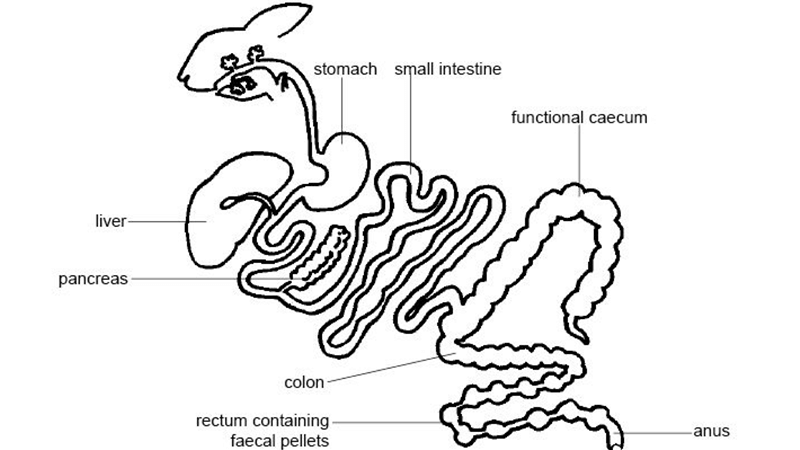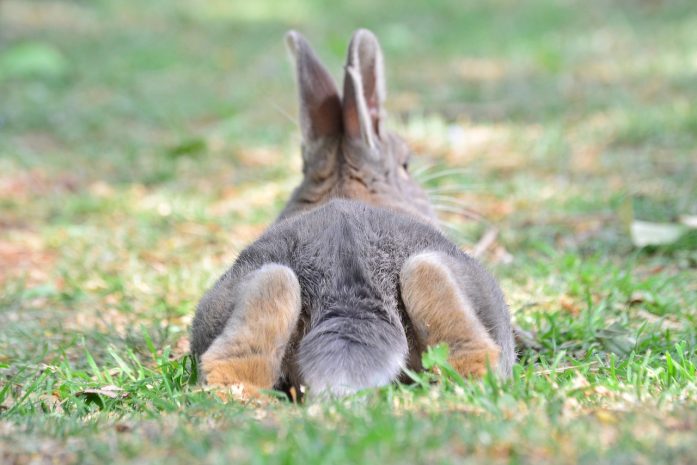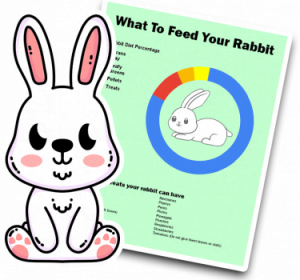
With rabbits being so vulnerable to GI issues, not knowing if they can fart is a completely valid question. Almost all mammals fart, but what about rabbits? Can Rabbits fart? Are their farts loud? Does it mean there’s something wrong with their diet?
We know that this is a laughing matter in human nature. But when it comes to rabbits, farts play an essential role in their digestive system. Therefore, we created a list of the most important things you should know about rabbit farts.

Do Rabbits fart? The short answer is – YES! Rabbits do fart. Some people would say that this is a logical answer since all animals fart. But that is simply not true. You likely won’t hear your bunny fart and that’s completely fine, as long as they’re not getting trapped wind everything is working well.
Many animals like octopuses, soft-shell clams, birds, and even sloths – don’t fart. Besides, farting is not always a shameful thing when it comes to animals. Did you know that farting for manatees is a swimming technique? I didn’t know that. But let’s focus on rabbits today. And, yes, farting for rabbits can be an emergency.
Even though rabbits are herbivores, which means that they feed on plants, they have a monogastric digestive
system that is similar to ours. The most significant difference is the size of the intestine and cecum.
Rabbits have enlarged bowels, which gives the plant materials more time to digest. However, rabbits usually have a low-fiber diet, which is high in carbohydrates. This can lead to a gas build-up (Known as GI stasis). So, rabbits do not only fart – but they have to do it in order to avoid a gas build-up, which can be deadly to them if not treated on time.

According to many rabbit lovers, you can neither hear nor smell a rabbit fart. And they are only partly correct. Even though the rabbit farts are inaudible and have no smell most of the time, sometimes they can be as loud as “FRRRT!” and as smelly as swamp water.
So, if you are in your room with your family, petting your rabbit – don’t blame your family members whenever you sense a foul smell. It might not be their fault.
If your rabbit eats has a change in their diet, you may hear or smell farts more often. Remember always to ease your rabbits into new dietary changes.
As I’ve already mentioned, rabbit farts are inaudible and have almost no smell most of the time. But if you’re spending a lot of time with your bunny, you should be able to sense some of them since detectable farts normally occur from time to time.
However, if you notice that your bunny doesn’t fart at all, there might a problem with its digestive system. A lack of farts, or no farts at all, can cause a gas build-up, which can be extremely painful for your bunny and might escalate very quickly into something known as stomach bloat.
You should regularly check by gently pushing against your rabbit’s stomach to check for any bloating, this can be done when they are laying down or whilst petting them. Instead of being repelled by it, pay close attention to your rabbit farts. They are very important for its health.

If your bunny acts normal, seems playful, and doesn’t have a decreased appetite, you probably shouldn’t worry. But if you notice some changes in its behavior, loud noises coming from its stomach, and a low body temperature, then rabbit gas or GI Stasis might be the case.
The reason for this could be anything from an inappropriate diet, a lot of food low in fiber and high in carbohydrates, dehydration, or even stress. But don’t worry. There are several ways how to treat rabbit gas and GI Stasis.
First, you have to keep your bunny warm. You can do this by wrapping it in a blanket with two bottles of not very hot water on either side. Heating pads can help too. After that, you can try gently massaging its
stomach. When you do this, you might hear gurgling sounds. And that’s a good sign.
Keep doing this until your rabbit farts. Moreover, you can try Simethicone (One milliliter every hour for three hours) – or Mylicon drops (One pipette every 45 minutes), which have proven to be safe for rabbits. These are more commonly known as “Gripe Water”, please do check with your veterinarian beforehand to make sure your rabbit can have this.
Nevertheless, if neither of these methods works, you must consider taking your bunny to the vet.
Having the ability to process fiber and all the other nutrients needed for growth makes the rabbits adaptable to many environments in the wild. But when we make them our pets and keep them at home, we have to be extra careful of what kind of food we give them.
You’d be surprised how many types of food that we consume on a daily basis are actually not good for our rabbit pets. Some of them make them gassy while others are even poisonous to them.
All of these foods are known to produce gas in rabbits’ digestive systems. Therefore, you should keep every portion small with occasional treats. You should also reduce the fruits, which are high in carbohydrates and
sugar, to a minimum by sparing them with low carbohydrate foods.
Whatever you do, never give chocolate to your rabbit, let alone force it to eat it. Chocolate is poisonous to a
rabbit’s digestive system.
You shouldn’t feed your rabbits with either bread or cookies on a daily basis. For one thing, they would make your rabbits obese and inactive. For another, they contain a lot of starch and carbohydrates, which is bad for rabbits. Try hay or sprouts instead. They contain enough amount of fiber to maintain a good digestive system in the rabbits’ stomachs.
Eating too fast can cause a rabbit to swallow too much air. And since they cannot belch as humans, the air
has come as a gas through their anus. The most common reasons why your rabbit is eating too fast are hunger and anxiety.
Hunger: Do you give your rabbits their meal on time? Late meals mean hungry rabbits. And hungry rabbits
tend to eat a lot faster than usual.
Anxiety: This has a lot to do with dominance. If you keep more than one rabbit, the most dominant one will
usually get to eat first. And the other ones will always eat after him, and they’ll eat a lot faster due to the fear
of losing their meal.
Many studies have shown that stress in rabbits has a negative impact on their thyroid gland, which causes gas buildup.
Common reasons for a rabbit’s stress:
Therefore, whatever you do, you should always try to keep your rabbit calm and relaxed unless you’re playing of course.
Not drinking enough water causes a rabbit’s electrolytes to go unstable, which means that the body uses the water it already has inside, creating a trapped gas in the stomach. So, yes, dehydration is one of the reasons for rabbit gas.
Nevertheless, if your rabbit is not drinking enough water, there has to be a reason why. Unlike other animals, rabbits don’t drink contaminated water.
And if your rabbit avoids drinking but doesn’t have a problem eating, there must be something wrong with the water. So, always ensure you give your rabbit good, clean water.
However, if your rabbit avoids eating food and drinking water, you should talk to a vet.
Yes, they can! If GI Stasis appears in a rabbit’s digestive system, the rabbit has 24 hours at the most to get
cured. Otherwise, death will occur. Rabbit Gas, on the other hand, is nothing less scary. The gas in the stomach is blocking the blood vessels by forming gas bubbles.
And when the blood vessels are blocked, blood cannot travel to the brain and all the other essential organs, which means that the rabbit cannot survive on its own without any medical and human help. We hope that our list of the most important things about rabbit farts has been helpful to you
Unfortunately, the gas build-up can occur, but there are some great things you can do to help ease your rabbit’s condition. If none of these tips seem to help, please take your rabbit to your vet as soon as possible.
As mentioned above, slowly rubbing your rabbit’s stomach can be a great way to encourage the gas to move through your rabbit’s digestive tract faster. Simply push down gently and move it around in a circular motion on your rabbit’s stomach moving up and down to ensure full stomach coverage.
Much like ourselves, rabbits are more likely to pass gas if you get them moving, this may be difficult as gas build-up can cause pain in your rabbit which will in turn make them not want to move. However, encouraging movement but giving their bottoms a little nudge should help with passing gas through their digestive tract.
If your rabbit appears lethargic or grunting, it may be suffering from GI Stasis which is a critical condition and should be fixed by calling your vet urgently.

By entering your email address you agree to receive emails from Cottontailclub. We'll respect your privacy and you can unsubscribe at any time.